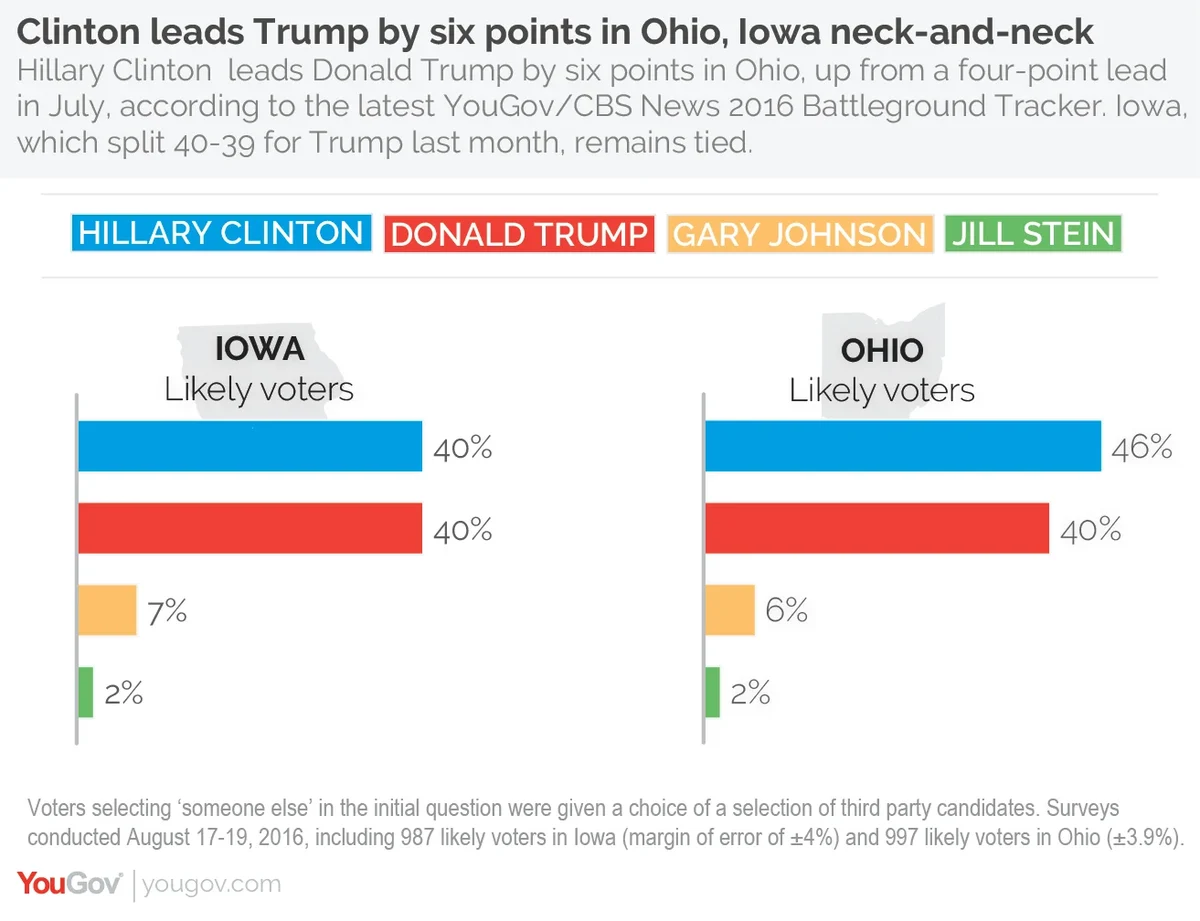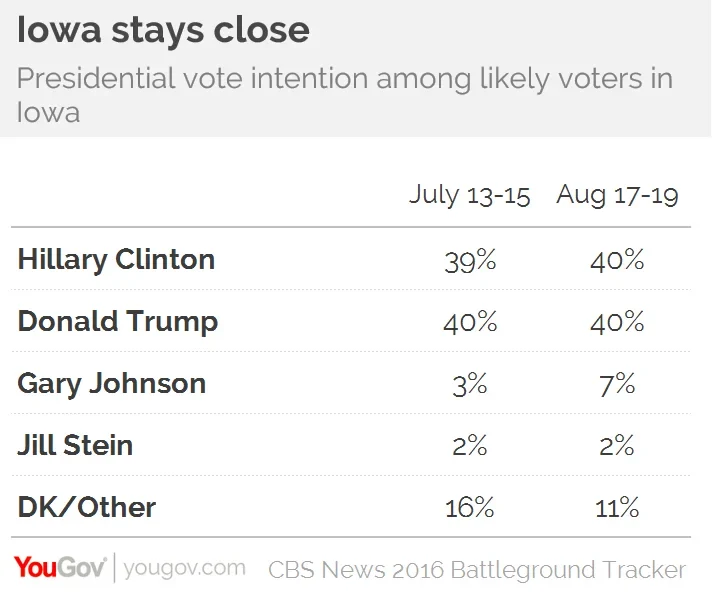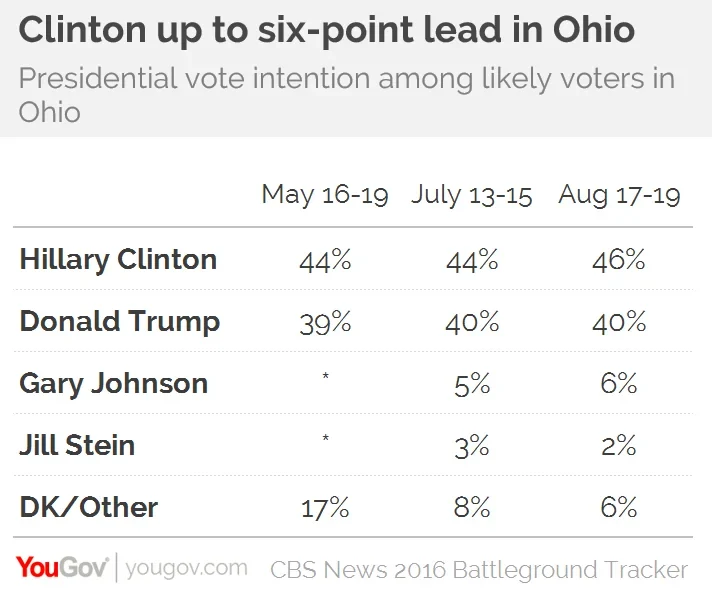The latest wave of the YouGov/CBS News 2016 Battleground Tracker polled likely voters on the race for the White House as well as two competitive Senate races
Democrat Hillary Clinton leads Republican Donald Trump by six points among likely voters in Ohio, while the two are tied in Iowa, according to the latest wave of the YouGov/CBS News 2016 Battleground Tracker.

Both are states that have been polled for the Battleground Tracker before, most recently in mid-July, just before the Republican National Convention. Fifty-five percent of the August 17-19 wave in Iowa are recontacts, and 92% of the Ohio respondents have also taken at least one previous wave.
In July the race was too-close-to-call in Iowa, and Trump had the same level of support as now – 40% – while Clinton was one point lower.

The share of voters who are undecided or uncommitted to any of the four candidates named has fallen by five points since July, to 11%. But most of the support has moved to Libertarian Party candidate Gary Johnson, who now garners 7%. That’s a notable increase for a third-party challenger, and suggests continued discontent with the major party’s nominees in a state Barack Obama won twice, but which went Republican in 2004. Both Clinton and Trump also struggle with voters from their own parties. Only 80% of Iowa Democrats back Clinton, and 76% of Republicans back Trump.
In Ohio, the race has been moving slightly more in Clinton’s direction. Her support has grown from 44% in May and July to 46% now, while Trump remains at 40%.

Ninety percent of Democrats back Clinton in the all-important swing state, while just 79% of Republicans back Trump. However, most of the shift towards Clinton comes from independents. Independents still break for Trump by a six-point margin (42-36), but that’s down from a 19-point margin (46-27) in July. The former Secretary of State also benefits from overwhelming support among the state’s African-American voters, topping her Republican opponent 91-3, a slight improvement from the 85-6 split in the previous month.
Looking more comprehensively at findings from the Battleground Tracker since the end of the conventions, Trump is facing a steep climb to the 270 electoral votes he needs. Last week, YouGov found Clinton leading by nine points in New Hampshire and five points in Florida. The week before that, Clinton led by 12 points in Virginia. If the Democratic nominee were to take these leads into November, while winning in Ohio and other states that have voted Democratic in the last four presidential elections, she would have 311 electoral votes.
Senate races
Iowa and Ohio are also two states with Senate seats currently held by Republicans, both of whom are up for reelection in 2016.
In Iowa, Sen. Chuck Grassley holds a seven-point (45-38) lead over Democrat challenger and former Lieutenant Governor, Patty Judge. In July, Grassley led by eight points (45-37). Eighty-eight percent of Republicans back Grassley, putting him 12 points ahead of Trump with these core voters. Overall, 76% of voters say Grassley is a “different kind of Republican” from the man at the top of the ticket, providing some explanation why he may be able to run five points ahead of Trump.
However, polling below 50% – against a challenger who hasn’t run for statewide office since 2006 – may not be wholly comforting for the six-term incumbent, particularly in a state that tilted Democratic in recent presidential elections. Another silver lining for Judge is that 17% of Democrats and 19% of independents are still undecided, whereas only 9% of Republicans are, potentially giving Grassley less room to grow as voters make up their minds.
A similar set of circumstances holds in Ohio, where Sen. Rob Portman is running six points ahead of Donald Trump and seven points (46-39) ahead of his Democratic challenger, former Ohio Governor Ted Strickland. 11% are undecided. If anything, however, Portman appears to be weathering the national and statewide headwinds better than Grassley. In July, Portman led Strickland by just one point, 41-40, and he has consolidated support among independents (rising from 45% to 50%) over a period when Trump’s advantage deteriorated with the same group. Identical to Grassley, 76% of likely voters in the state say Portman is a “different kind of Republican” than Donald Trump.
Strickland’s challenge is to shore up support among voters in Democratic-leaning groups who are hesitant about the former governor but who have not thrown themselves behind his Republican challenger, such as women and African-Americans – without losing more ground among those who are already breaking for Portman, such as men and white voters. Notably, Portman holds a 55-34 lead over Strickland among Ohio's college-educated whites, a traditionally Republican group with whom Clinton nevertheless leads Trump, 42-36.
Interviews were conducted August 10-12, 2016 for the CBS News 2016 Battleground Tracker. A detailed description of the methodology used to carry out the surveys can be found here.
See additional questions and demographic breakdowns for Iowa and Ohio.









